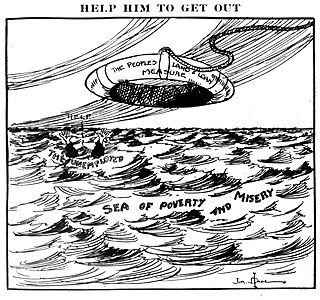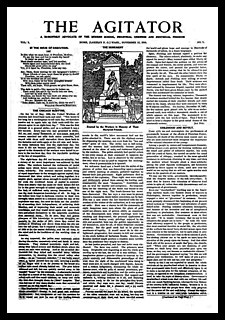Related Research Articles

The Industrial Workers of the World (IWW), members of which are commonly termed "Wobblies", is an international labor union that was founded in 1905 in Chicago, Illinois, in the United States. The origin of the nickname "Wobblies" is uncertain. The union combines general unionism with industrial unionism, as it is a general union, subdivided between the various industries which employ its members. The philosophy and tactics of the IWW are described as "revolutionary industrial unionism", with ties to socialist, syndicalist, and anarchist labor movements.

The United Farm Workers of America, or more commonly just United Farm Workers (UFW), is a labor union for farmworkers in the United States. It originated from the merger of two workers' rights organizations, the Agricultural Workers Organizing Committee (AWOC) led by organizer Larry Itliong, and the National Farm Workers Association (NFWA) led by César Chávez and Dolores Huerta. They became allied and transformed from workers' rights organizations into a union as a result of a series of strikes in 1965, when the most Filipino farmworkers of the AWOC in Delano, California, initiated a grape strike, and the NFWA went on strike in support. As a result of the commonality in goals and methods, the NFWA and the AWOC formed the United Farm Workers Organizing Committee on August 22, 1966. This organization was accepted into the AFL-CIO in 1972 and changed its name to the United Farm Workers Union.

Founded in 1925, The Brotherhood of Sleeping Car Porters (BSCP) was the first labor organization led by African Americans to receive a charter in the American Federation of Labor (AFL). The BSCP gathered a membership of 18,000 passenger railway workers across Canada, Mexico, and the United States. Beginning after the American Civil War, the job of Pullman porter had become an important means of work in the black community in the United States. As a result of a decline in railway transportation in the 1960s, BSCP membership declined. It merged in 1978 with the Brotherhood of Railway and Airline Clerks (BRAC), now known as the Transportation Communications International Union.

The Seattle General Strike of 1919 was a five-day general work stoppage by more than 65,000 workers in the city of Seattle, Washington from February 6 to 11. Dissatisfied workers in several unions began the strike to gain higher wages, after two years of wage controls during World War I. Most other local unions joined the walk-out, including members of the American Federation of Labor (AFL) and the Industrial Workers of the World (IWW). Government officials, the press, and much of the public viewed the strike as a radical attempt to subvert American institutions.
The Communist Party USA, ideologically committed to foster a socialist revolution in the United States, played a significant role in defending the civil rights of African Americans during its most influential years of the 1930s and 1940s. In that period, the African-American population was still concentrated in the South, where it was largely disenfranchised, excluded from the political system, and oppressed under Jim Crow laws.
The Seattle Civil Rights and Labor History Project, one of the Pacific Northwest Labor and Civil Rights History Projects, is dedicated to social movements and labor history in the Pacific Northwest. It is directed by Professor James N. Gregory of the University of Washington. The project represents a unique collaboration between community organizations and University faculty, as well as undergraduate and graduate students. It has become a model of public history across the US and has been credited with changing the discussion of race and civil rights in the Seattle area.
The United Cannery, Agricultural, Packing, and Allied Workers of America (UCAPAWA) was a labor union formed in 1937 and incorporated large numbers of Mexican, black, Asian, and Anglo food processing workers under its banner. The founders envisioned a national decentralized labor organization with power flowing from the bottom up. Although it was short-lived, the UCAPAWA influenced the lives of many workers and had a major impact for both women and minority workers in the union.

The Northwest Labor Press is a newspaper which covers the American labor movement in the Pacific Northwest. It was known as the Portland Labor Press from 1900 to 1915, the Oregon Labor Press until 1986, and by its present name since then.
The National Negro Congress (NNC) was formed in 1936 at Howard University as a broadly based organization with the goal of fighting for Black liberation; it was the successor to the League of Struggle for Negro Rights, both affiliated with the Communist Party. During the Great Depression, the party worked in the United States to unite black and white workers and intellectuals in the fight for racial justice. This period represented the Party's peak of prestige in African-American communities. NNC was opposed to war, fascism, and discrimination, especially racial discrimination. During the Great Depression era, a majority of Americans faced immense economic problems. Many lost their jobs and as a result, were forced to live at the margins of society. The crisis highlighted inequities for many African Americans, who were unemployed at higher rates than white.

The Loyal Legion of Loggers and Lumbermen (LLLL), commonly known as the "Four L" (4L), was a company union found in the United States during World War I in 1917 by the War Department as a counter to the Industrial Workers of the World.
Ernesto Mangaoang was a Filipino American labor organizer. A communist and longtime leader of immigrant Filipino laborers, Mangaoang was closely associated with Chris Mensalvas, and was a personal friend of the famous Filipino American intellectual and activist Carlos Bulosan.
The Martin Luther King. Jr. County Labor Council, AFL-CIO, (MLKCLC) is the central body of labor organizations in King County, Washington. The MLKCLC is affiliated with the national AFL-CIO, the central labor organization in the United States, which represents more than 13 million working people. Over 125 organizations are affiliated with the MLKCLC, and more than 75,000 working men and women belong to Council-affiliated organizations. Not only does the MLKCLC support labor organizations, but it acts as a voice for the interests and needs of the working people in King County, WA.
The Waterfront Workers History Project is a program of the University of Washington, which serves to document the history of workers and unions active on the ports, inland waterways, fisheries, canneries, and other waterfront industries of the western United States and Canada, specifically, California, Oregon, Washington, Alaska, and British Columbia. In collaboration with the Pacific Northwest Labor and Civil Rights History Projects, and sponsored by the Harry Bridges Center for Labor Studies, the Project is a collective effort to organize and present historical data covering significant events from 1894 to the current day.
The Great Depression in Washington State Project is a multimedia web resource based at the University of Washington in Seattle. Created in the context of renewed economic hard times in 2009, the Project includes essays, maps, digitized newspaper articles and hundreds of rare photographs from the 1930s. In addition to rapid industrialization and demographic change, the Depression ended decades of Republican rule, created a powerful labor movement, changed the face of the Democratic Party and molded new set of political priorities. In several thematic sections, the Project examines these changes in everyday life, culture, politics and work. The Project is one of the Pacific Northwest Labor and Civil Rights History Projects, characterized by student-led research and public scholarship.
The Labor Press Project: Pacific Northwest Labor and Radical Newspapers is a multimedia website housing thousands of digitized articles and editions from the late 19th century to the present. Newspapers and newsletters from unions, early socialist groupings, anarchist communes, ethnic community groups and radical organization are presented on the site with accompanying research articles on their context and evolution. Many of the digitized materials were previously unavailable except as archival material. The extensive resource is one of Pacific Northwest Labor and Civil Rights History Projects developed by the University of Washington.
The Pacific Northwest Labor and Civil Rights History Projects are a series of multimedia public history initiatives. The projects cover a range of themes and subjects in the Northwest and Seattle, with a particular focus on working people and their movements. The effort, particularly the Seattle Civil Rights and Labor History Project, has garnered praise for the breadth of primary and secondary resources made available and its joint creation by academics, community members and hundreds of students. It has been recognized as a model of digital and publicly engaged scholarship.
The 1935 Pacific Northwest lumber strike was an industry-wide labor strike organized by the Northwest Council of Sawmill and Timber Workers Union (STWU). The strike lasted for more than three and a half months and paralyzed much of the lumber industry in Northern California, Oregon and Washington state. Although the striking workers only achieved part of their demands, the repercussions of the long and often violent strike were felt for decades. Over the next several years, a newly radicalized and militant generation of lumber workers would go on to spark several more industry-wide strikes.
The Tampa cigar makers' strike of 1931 took place in Ybor City, Tampa, Florida in the months of November and December. Some strikers were jailed, "Lectors" were banned and there was a lockout. Following legal intervention, some workers returned to work at previous wage levels but others were not re-employed. Lectors had by tradition been elected by the workers and, as well as reading aloud newspaper articles, often from left-wing radical publications, they recited and acted more generally, including from classic works – effectively they provided a form of education for illiterate workers. The most significant effect of the strike in the longer term was that the lector culture was brought to an end.

The Agitator was a radical newspaper published by Jay Fox of the anarchist Home Colony in the American state of Washington from 1910 to 1912.
African-American socialism is a political current that emerged in the nineteenth century. However, it became influential before coming to the forefront nationally. This is an economic and political theory of social organization that means the production, distribution, and exchange should be owned or regulated by the community. For African Americans socialism has represented a potential for equal class status, humane treatment as laborers, and for some ideologists a means of dismantling American capitalism. Black liberation is important when seeking socialism. Liberation refers to an individual being freed from imprisonment, slavery, or oppression.
References
- ↑ Dublin, Thomas (Summer 2010). "The New Labor History, the New Media, and New Challenges" (PDF). Labor: Studies in Working-Class History of the Americas. 7 (2): 83–96. doi:10.1215/15476715-2009-078.
- ↑ Gregory, James; Trevor Griffey (April 2007). "Teaching a City about Its Civil Rights History: A Public History Success Story". Perspectives. 45 (4).